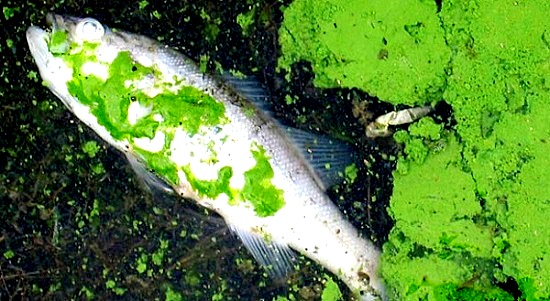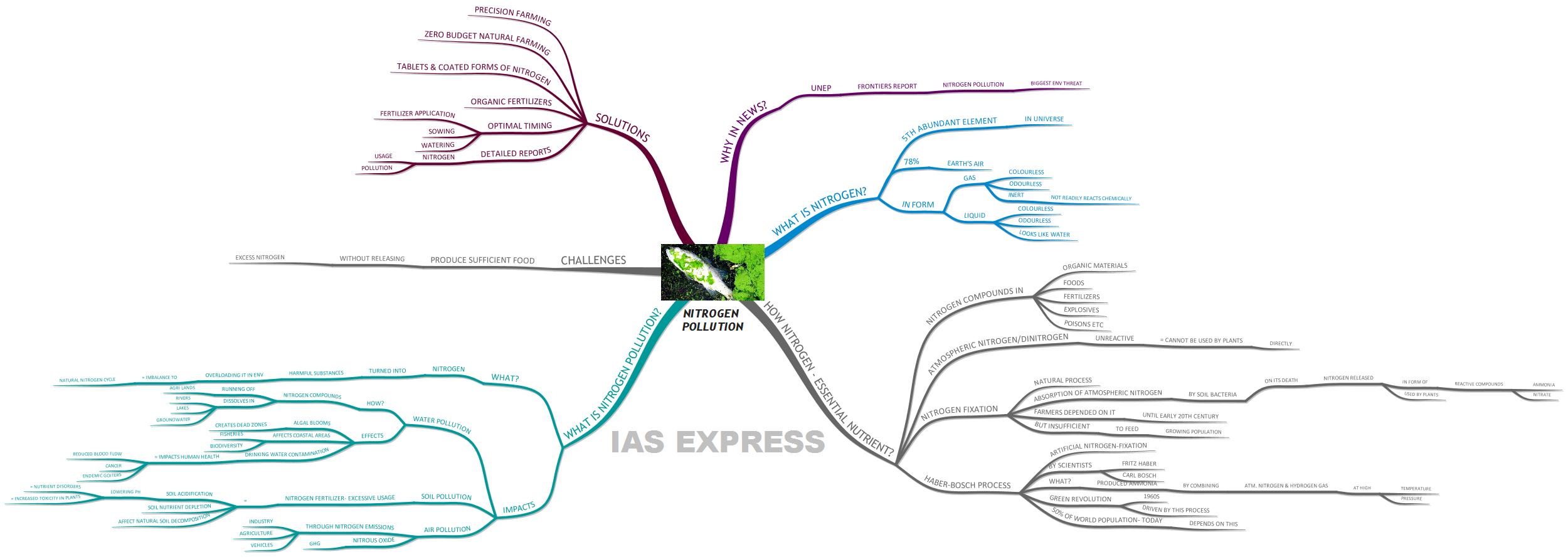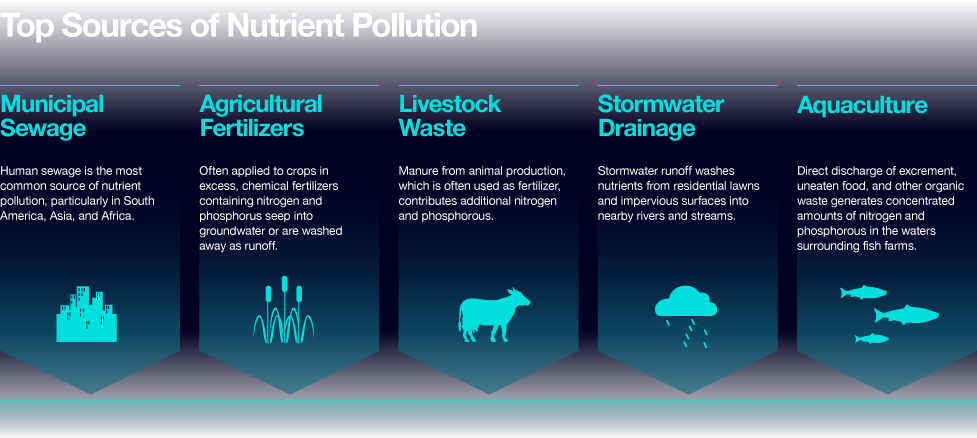Nitrogen Pollution – The Biggest Environmental Threat

From Current Affairs Notes for UPSC » Editorials & In-depths » This topic
IAS EXPRESS Vs UPSC Prelims 2024: 85+ questions reflected
The UN Environment in its Frontiers report mentioned that Nitrogen Pollution is one of the biggest environmental threats faced by humans today and needs urgent measures from countries around the world.
Nitrogen is essential for life, however, the excess nitrogen pollution has huge consequences on humans and the environment. It is 300 times more potent than CO2 as a greenhouse gas besides its negatives effects on air quality and the ozone layer.
Altogether, humans are emitting a huge amount of reactive nitrogen that threatens health, climate, and ecosystems, making nitrogen one of the most important pollution issues facing humanity.
However, pollution caused by Nitrogen is being overlooked by governments and they focus only on carbon emissions, thus ignoring the growing risks to health and the environment.
What is Nitrogen?
- Nitrogen is the 5th most abundant element in the Universe.
- It accounts for 78% of Earth’s air.
- In the form of gas – it is colourless, odourless and mostly considered as an inert gas (not readily react chemically).
- In the form of liquid – it is also colourless, odourless and looks like water.
How does Nitrogen work as an essential Nutrient?
- Nitrogen is essential to life on Earth because the compounds of Nitrogen are present in foods, fertilizers, organic materials, explosives, poisons etc.
- However, atmospheric nitrogen, or dinitrogen, is unreactive and cannot be utilized by plants directly.
- Until the early 20th century, farmers depended on a natural process known as nitrogen fixation – The assimilation of atmospheric nitrogen by soil bacteria and its release for plant use on the death of the bacteria in the form of reactive compounds such as ammonia and nitrate.
- However, the natural nitrogen cycle was insufficient to feed the growing population.
- Scientists Fritz Haber and Carl Bosch addressed this issue by producing ammonia by combining atmospheric nitrogen with hydrogen gas at high temperature and pressure. This process is called the Haber-Bosch Process.
- Green revolution, which was instrumental in creating food security in the developing nations in the 1960s, was driven by artificial nitrogen-fixation.
- Today, about 50% of the world’s population depends on this process for its nutrition.
How did Nitrogen turn into pollutant from nutrient?
- Nitrogen is an inert gas that is important for life. However, we are changing it into forms that are harmful + overloading it in the environment = causing an imbalance to the natural nitrogen cycle.
- Nitrogen becomes a pollutant when it escapes into the environment and reacts with other organic compounds.
What are the negative impacts of nitrogen pollution?
Water Pollution:
- Nitrogen compounds running off agricultural lands and dissolves in rivers, lakes or groundwater = water pollution.
- It creates harmful algal blooms and creates dead zones in our waterways and oceans as the algae produce toxins which are harmful to human and aquatic organisms.
- It indirectly affects fisheries and biodiversity in coastal areas as well.
- Drinking water is being contaminated by excessive nitrate concentrations = adverse impact on human health such as reduce blood flow, cancer, and endemic goiters.
Soil Pollution:
- As the world needs to feed an ever-growing population, loss of arable land is a major global problem.
- Excessive use of nitrogen fertilizer causes soil acidification & soil nutrient depletion. The lowering pH as a result of the acidification = nutrient disorders + increased toxicity in plants. It may also affect natural soil decomposition.
Air Pollution:
- Nitrogen emissions from industry, agriculture and vehicles = air pollution.
- The release of nitrous oxide is essentially a greenhouse gas which is harmful to the environment.
What are the challenges ahead?
- Nitrogen is crucial to food production in India, however, its excessive usage in agriculture has put us under serious risk.
- We cannot produce sufficient food to feed the entire nation without nitrogen, but at the same time, we cannot keep releasing a higher amount of nitrogen due to its polluting effects.
- Thus the challenge is to optimally utilize the nitrogen while reducing its negative impacts.
What is the way forward?
- Since the issue of nitrogen pollution starts to gain global attention, there have been innovations seeks to improve its efficiency by optimizing usage.
- A simpler method of minimizing nitrogen application in soil is Precision farming where small quantities of nitrogen are administered routinely rather than applying large doses uniformly across the field.
- Zero Budget Natural Farming which involves usage of locally available materials such as cow dung and cow urine to increase soil productivity and plant growth.
- Also, tablets and coated forms of nitrogen, when applies at the root level = release nutrients slowly to the crops.
- Notably, Bangladesh has managed to improve the efficiency of nutrient uptake by plants by applying fertilizers through tablets.
- A similar initiative has been taken in India with neem-coated urea.
- These methods combined with the organic fertilizers and optimal timing of application, sowing, and watering, have shown marked improvement over traditional efficiencies of nitrogen.
Developed regions such as the US and Europe have published detailed reports regarding nitrogen usage and pollution. However, India is nowhere near aggregating something similar to its own. Thus the Nitrogen pollution is the problem of improper management rather than inability. The costs of abating nitrogen pollution would be much lesser than the benefits to health and the environment.
If you like this post, please share your feedback in the comments section below so that we will upload more posts like this.



